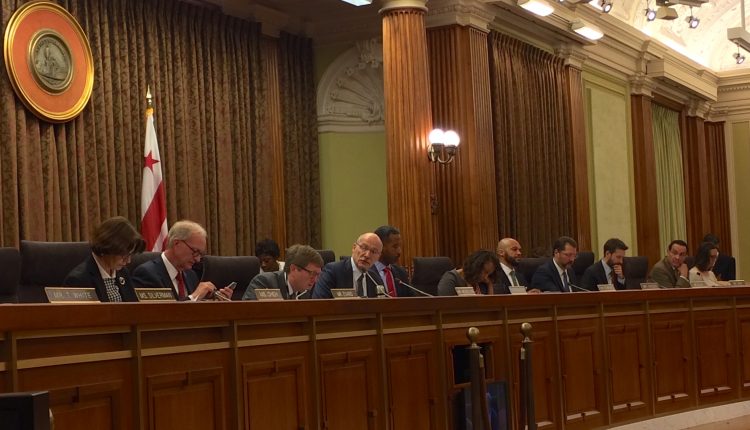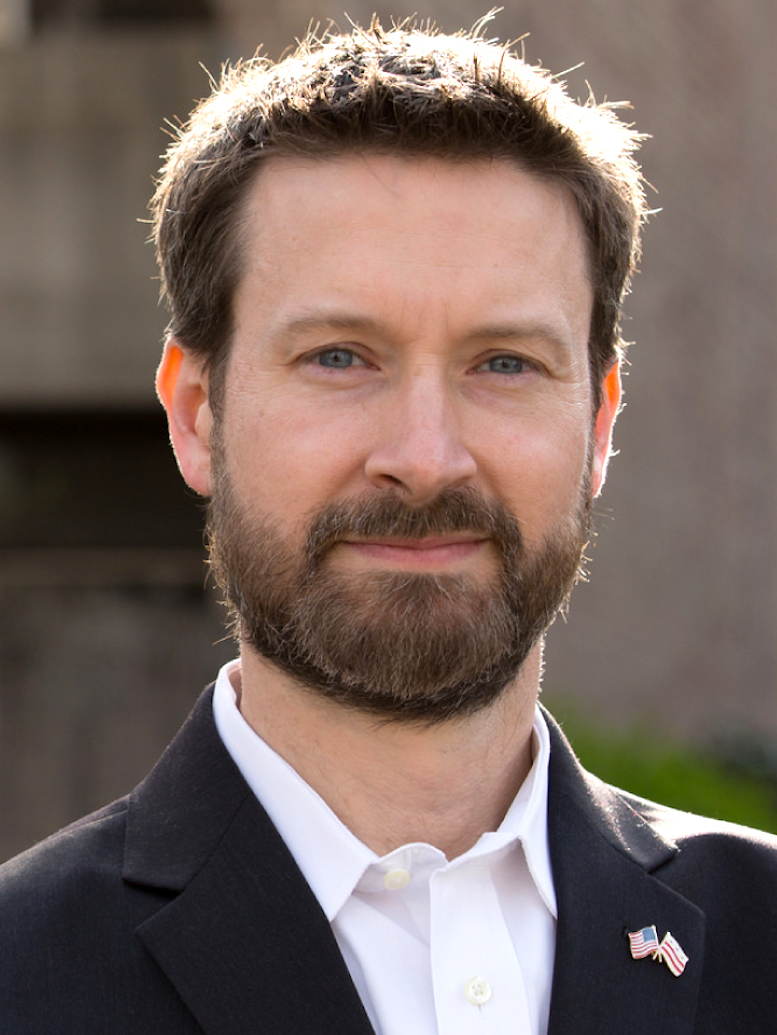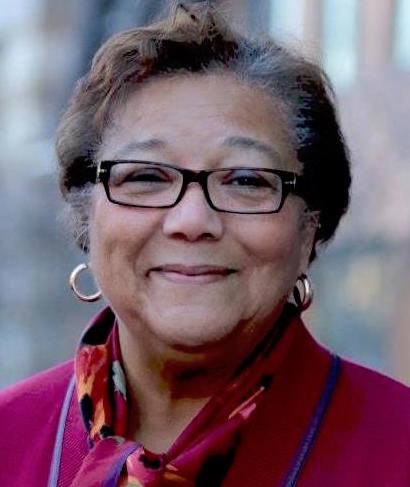
From legalizing sports betting to closing a rent-control loophole, new council bills tackle myriad subjects
Since returning in mid-September from summer recess, DC Council members have drafted a wide array of proposed legislation in hopes of passage before the two-year session ends in December. Among the notable new bills under consideration are measures to legalize sports betting in the District, mandate open-caption movie screenings, and set up funding streams to pay for lead elimination and baby-proofing. More introductions are likely at today’s legislative meeting.

The first bill introduced at the Sept. 18 meeting was the Sports Wagering Lottery Amendment Act of 2018, from Ward 2 Council member Jack Evans and five of his colleagues. The proposed legislation would authorize legal sports wagering in DC, with the District’s chief financial officer in charge of applicable rules and regulations. A public hearing is scheduled for Wednesday by Evans’ committee.
The Supreme Court overturned the federal ban on sports betting in May, and so far Delaware, New Jersey, West Virginia and Mississippi have legalized sports betting. Evans emphasized in his introduction that advertisements from West Virginia’s Hollywood Casino have specifically targeted DC residents.
Legalizing sports betting “would create a new revenue stream in the District, along with new jobs for our residents,” Evans said in his remarks. “By introducing this legislation, we can begin the conversation to move forward towards a world-class structure for sports betting in the District of Columbia.”
The bill has been referred to the Committee of Finance and Revenue, with comments requested from the Committee on the Judiciary and Public Safety.
The Lead Hazard and Elimination Amendment Act of 2018, drafted by Ward 6 Council member Charles Allen and introduced with the backing of seven of his colleagues, aims to protect residents by strengthening regulations around lead-based paint in rental units.

Allen argues that lead paint poses a unique health risk to young children and pregnant women. The act would establish a fund to assist landlords with removal of lead-based paint. The bill also makes it easier for tenants to take legal action against landlords who aren’t complying with the law.
“We need to give District residents, especially families, peace of mind and the protection of the law to know their home is putting the health of their young children at risk,” Allen said in his introduction.
The bill has been referred to the Committee on Transportation and the Environment, with comments from the Committee on Housing and Neighborhood Revitalization.
The Babies Safe at Home Act of 2018, introduced by at-large Council member Robert White with backing from eight colleagues, would authorize grants of up to $1,000 for low-income families who need assistance baby-proofing their homes.
“As the father of a 2-year old daughter, I understand how it feels to worry constantly about my child’s safety and how difficult and expensive it is to baby-proof at home,” White said in his introduction. (White announced Monday on Twitter that he and his wife are expecting a second girl come March.)
The bill was referred to the Committee on Housing and Neighborhood Revitalization, with comments from the Committee on Human Services.

The Safe Fields and Playground Act of 2018, introduced by Ward 3 Council member Mary Cheh with support from eight colleagues, would require the Department of General Services, the Department of Parks and Recreation, and the District of Columbia Public Schools to publish and regularly update a master list of public recreation spaces in the District on the DGS website with information on the materials used for any improvements, the date of installation or construction, and results of required safety tests. The bill comes amid continued public concerns raised about the use of artificial surfaces, including the high temperatures that fields and play areas can reach in the midday sun.
Under the bill, the mayor would also have to provide the council with results of a study addressing the safety of synthetic materials currently used in construction projects at DC recreation spaces. DGS would have to provide the council with a remediation plan for any public recreation spaces that where hazardous construction materials were used or where other health and safety standards were violated.
The bill was referred to the Committee on Transportation and the Environment, which Cheh chairs. A public hearing is scheduled for Nov. 1.
The Student Safety and Consent Education Act of 2018, introduced by at-large Council member David Grosso with support from six colleagues, would require DC public schools and public charter schools to adopt and implement a policy to prevent and address peer-to-peer sexual harassment, sexual assault and dating violence among students. The bill would also require staff development training.
The legislation was referred to the Committee on Education, which Grosso chairs. A hearing is scheduled for Nov. 1.
The Open Movie Captioning Requirement Act of 2018, introduced by Ward 6 Council member Charles Allen with support from three colleagues, would require licensed movie theaters to provide open movie captioning at specified times. A movie theater with more than three screens would need to provide at least four closed-captioning shows per week, with two of these showings being during peak movie attendance hours.
“This bill ensures some of the screenings are aired during the afternoon, when most residents … like to go see movies,” Allen said in his introduction, citing complaints that some theaters that offer such screenings do so only at inopportune times.
Theaters would need to provide notice to all customers through its social media channels and advertisements of the availability of open captioning in the same manner it publicizes other screenings.
Advocates expressed support for the bill via Twitter, but also a word of warning. “We anticipate heavy resistance from the same big theaters that killed a similar bill in Nebraska,” tweeted Ward 6 resident Robb Dooling. “But we know we can count on you to support us.”
The bill was referred to the Committee of the Whole.

During the Oct. 2 legislative meeting, at-large Council member Anita Bonds with support from Ward 7 Council member Vincent Gray introduced the Rent Charged Clarification Amendment Act of 2018. The bill tackles higher-than-expected increases that can arise in some instances.
“The bill makes structural changes to the Rental Housing Act of 1985 to prevent situations where rents are increased to above-market levels that endanger rent-concessions abuses,” Bonds said in her introduction.
Although the council passed legislation in 2006 to abolish rent ceilings, problems have arisen with the use by some landlords of “de-facto rent ceilings” created when they have offered concessions to new tenants. Housing providers often need to offer discounted rents in order to lease their units, but some then proceed to set the next year’s permissible rent increase based on the higher amount.
“Tenants are then faced with the stark option of trying to find other affordable housing, or just tightening their belts and paying the much-higher rent,” Bonds said.
The bill — along with a companion measure that Bonds introduced at the same meeting — would define “rent charged” for all District units as the amount of rent tenants are actually paying as of the effective date of the bill.
The legislation would make some provision for discounted rents at least 10 percent less than the amount charged to the prior or current tenant; in such cases, an unused rent increase would expire after 30 days, meaning that landlords could not “bank” past amounts that they never implemented.
Bonds offered a real-world example: If a renter were paying $2,000 a month for a unit with a de-facto rent ceiling of $2,500, he or she would expect an increase the next year to $2,068 under the District’s rent control laws. But if the landlord instead bases the increase on the $2,500 figure, then the tenant would end up with a $2,571 bill the next year — “an untenable 28 percent increase,” Bonds said.
Both bills were referred to the Committee on Housing and Neighborhood Revitalization, which Bonds chairs. A public hearing is scheduled for Oct. 29.

At-large Council member David Grosso introduced the Sense of the Council Urging Recognition of Indigenous Peoples’ Day Resolution of 2018 with support from eight colleagues. Grosso argued that DC falls short in adhering to its values of equality, diversity and inclusion by celebrating Columbus Day. The resolution backs the idea of renaming the second Monday in October Indigenous Peoples’ Day, celebrating the Native Americans who arrived in North America before Christopher Columbus.
“Christopher Columbus enslaved, colonized and massacred thousands of indigenous people in the Americas,” Grosso said in his introduction.
The bill was referred to the Committee of the Whole. Chairman Phil Mendelson, who heads the Committee of the Whole and controls its agenda, was not among the legislators co-introducing or co-sponsoring the bill. A similar measure — the Indigenous Peoples’ Day Amendment Act of 2017 — was introduced last October by at-large member Anita Bonds and also rests in the Committee of the Whole, without any action scheduled in the past year.

Also on Oct. 2, Ward 1 Council member Brianne Nadeau with support from three colleagues introduced what she called “Elaine’s Law” — the Alimony Justice for Injured Spouses Amendment Act of 2018, a measure intended to protect spouses from unfairly having to pay alimony, legal fees and other spousal support to their abusers due to divorce proceedings. It would also allow the injured spouse to obtain a divorce within three months of a court finding that intrafamily violence has occurred.
The bill is named after Elaine Rigas, a Ward 1 resident.
“When Elaine married a man she believed would be the love of her life, she did not think she would become a part of a community of survivors of domestic violence,” said Nadeau in her introduction. “Elaine bravely sought her to protect her and her child.”
Because she was the highest wage earner in her family, a judge ordered her to pay spousal support for her husband. “She had to pay [his] health care costs, despite having her own from the abuse she suffered at his hands,” Nadeau said.
The bill was referred to the Committee on the Judiciary and Public Safety.


Comments are closed.